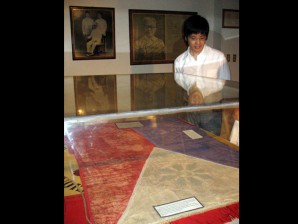
Former Baguio representative Honorato Aquino, lawyer of the Aguinaldo-Suntay family, said the old banner is the real flag which the late General Emilio Aguinaldo raised in 1898 to declare the country’s independence from Spanish rule.
He said it was displayed during this year’s celebration of Flag Day in the summer capital because Baguio has always been its home.
The Aguinaldo-Suntay family has been keeping the flag for Cristina Aguinaldo Suntay, the general’s daughter, who discovered the relic folded under Aguinaldo’s deathbed in 1964.
Although the National Historical Commission of the Philippines has not authenticated the flag, the family and many scholars believe it is genuine because its distinctive pale-yellow sun bears a golden face. The flag’s blue field also has a lighter hue compared to the dark blue field of the modern flag.
The phrase “Fuerzas Expedicionarias del Norte de Luzon” runs across one side of the flag, stitched with gold silk thread. The words “Libertad” and “Justicia” are stitched on the other side of the flag.
Aquino said the flag’s design “was made by General Aguinaldo himself in 1897, a year before they acknowledged making the flag in Hong Kong.”
But people who visit the Aquinaldo Museum on Happy Glen Loop here to view and reflect upon this flag every June 12 (Independence Day) have taken note of its deterioration by the way it was presented to the public.
The old flag’s existence was revealed in 1998 to coincide with the celebration of the centennial of Philippine Independence. The relic was put on display in the museum, inside a glass case that was placed at the center of a room filled with Aguinaldo’s belongings, including a wooden wheelchair and an old office desk.
A silk replica used to hang from the museum’s ceiling.
This week, people could only view the flag in extremely dim light, aided by softly lit lamps and a small and heavily painted sun roof.
War veterans, public school teachers and officials led by Vice Mayor Daniel Fariñas and Councilors Peter Fianza and Richard Cariño, were led for the first time to a remodeled flag case by Emilio Aguinaldo Suntay III, the general’s great grandson.
Suntay told the war veterans that the fabric has frayed so badly that its decay has become irreversible. He said experts, like those from the Smithsonian Institution, urged the family to keep the flag away from damp corridors and direct sunlight because it could no longer offer remedies that would arrest its decay.
The Flag Day celebration here was one of the few times when the city government acknowledged the relic’s role in Philippine history. The other time the city government honored the flag was in 2006, when former Baguio Mayor Braulio Yaranon led officials to the museum during that year’s Independence Day rites.
The city government also commissioned contractors to put up a fence around the Aguinaldo Museum to reinforce security there.
“Our national flag is unique. It’s one of a kind. Although it was patterned after the Katipunan flag… if you look at the flag, you are actually looking at two flags,” said Aquino.
“It is two flags in one because if the blue side is on top, as it is now, that means the country is at peace. But if the red side is up, then the country is at war,” he said.